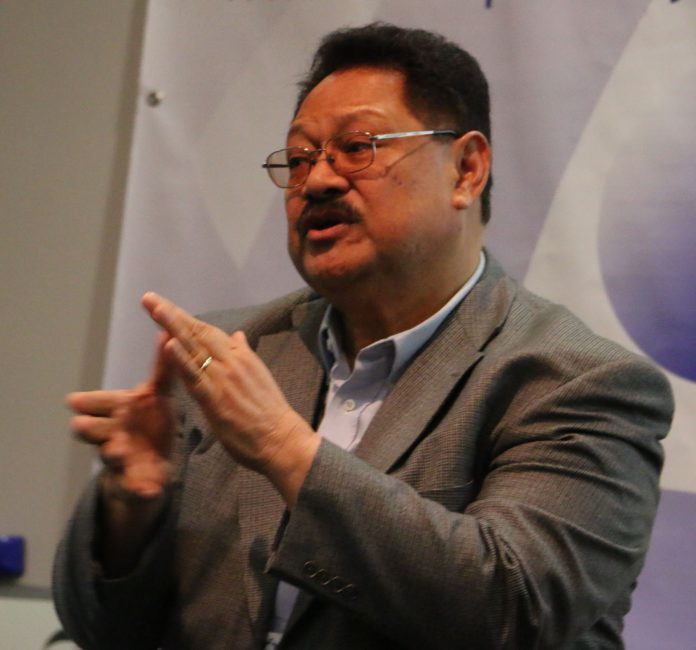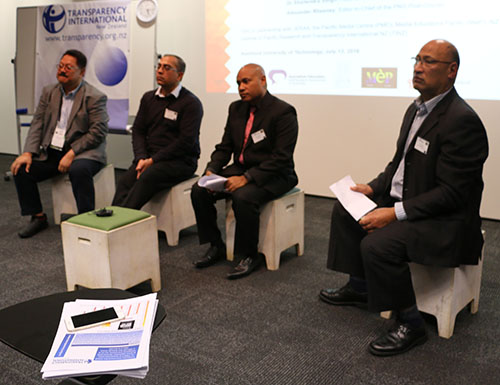
By Ami Dhabuwala
Each Pacific country is dealing with its own issues, but one of the major issues is corruption.
A preconference of the Journalism Education and Research Association of Australia (JERAA), AUT Pacific Media Centre (PMC) and Media Educators Pacific (MeP) in partnership with Transparency International (TINZ) gave a platform yesterday to discuss the corruption in the Pacific and the role of the media to deal with it.
Pacific director of TINZ and facilitator for the session, Fuimaono said: “Corruption is very much like cancer. It has to be treated early otherwise it would be massively expensive.”
He said the world has become intensively interested in what is going on in the Pacific.
The European Union, World Bank and Asian Development Bank are taking interest in the Pacific. The numbers of international treaties have been signed but “where all these resources are going?”, he said.
“Corruption is fundamentally crucial to successful development in the Pacific.”
Root cause
Kalafi Moala, publisher and broadcaster of Taimi ‘o Tonga group, said: “Corruption in Tonga is worse now than it has ever been.”
After spending 12 months in the prime minister’s office as a media advisor he decided it was totally useless and waste of his time.
“I found out that despite all the reforms we were doing and who were in charge, corruption continued to grow and to be dealt with,” he said.
Moala said the impact on the poor people with such corruption was extremely severe in small island nations like Tonga in the Pacific.
“We have in Tonga today a population that is broken hearted because their hope for something different in the society has been wounded. This government has not been able to deliver [on promises they made].”
He said there were causes for the corruption and there were questions that we needed to ask in the Pacific because every aspect of our society — at least in Tonga — we see the effect of corruption.
“First, we have to first find the cause of corruption and then we have to deal with it.”

Investigative journalists
Dr Shailendra Singh, head of journalism at the University of the South Pacific, said: “Politicians are not taking corruption seriously in Fiji.”
However, journalists with the lack of education and skills, were also major issues.
According to his PhD research in 2012, only 32 percent of journalists have more than 3 years of experience that is well below the global average and at the same time only 55 percent of the journalists have less than 6 years of experience.
In addition, Dr Singh said experienced journalists were not out in the front line. They were running newsrooms. Journalists who were reporting on field had less than 3 years of experience.
Oonly 49 percent of Fiji journalists had any formal academic education.
“You need experienced reporters with some investigative skills to analyse and report corruption systematically, which is lacking in Fiji,” Dr Singh said.
He said geopolitics and political correctness could be a further contributor to corruption.
Ask hard questions
Alexander Rheeney, editor-in-chief of the PNG Post-Courier, said Papua New Guinea was going through an economic and global political crisis at the moment.
“Any journalist would love to work in PNG because we have best stories in the world.”
He said journalists need to start asking hard questions now in PNG, as reporting and fighting against corruption was always a work in progress [situation] for PNG.
It is challenging for the PNG journalists to hold the leaders accountable and they are being the “meat in the sandwich”, said Rheeney.
“We have got people passionate about holding government accountable on one side and on the other side leaders want us to cover other issues in Papua New Guinea.”
However, he said as a journalist he and his colleagues were not only the defender of truth but also the defender of freedom of expression.
“The journalists should defend Papua New Guineans’ rights to express themselves,” he said.
Listen to TJ Aumua’s podcast on corruption and the role of the media.















































Transparency International is itself part of the corruption problem.
For the last 12 years, they have refused to answer why authors for a 2004 report on the Cook Islands were both associated with areas of corruption. As it turns out, one of the authors has recently been exposed as being linked to the #panamapapers.
At the time, nearly 90 TI chapters from around the world failed to answer email questions about what process they use to select report authors and avoid conflicts of interest. Only one chapter – from Papua New Guinea – bothered to answer. There was also complete silence from TI headquarters.
Much more recently, TINZ has also failed to answer questions about its views on United Nations Secretary General candidate Helen Clark, and her administration’s role in passing tax haven laws, and what confidence they have in her addressing these still outstanding issues on a global basis.
In too many cases, Transparency International is loaded with the kinds of people – lawyers, bankers and accountants – that cause most of the damage from corruption. It is good at talking the talk, but seems unable to walk.
#nextSG #helen4SG #corruption
Em nau,
Jason makes a fair point that Transparency International (TI) could take more of a leadership role in addressing corruption in the Pacific. However TI is not on its own in following priorities and focusing on Asia, Africa and South America and in preferring projects/programs over capacity building.
Jason refers to the 2004 Cook Islands Report but does not refer to the intervening 12 years where there have been major improvements in TI’s assessment protocols since then. Now, TI insists on independent researchers and then the protocols require many layers of peer review of evidence collected.
When TINZ carried out its 2013 National Integrity Assessment for New Zealand over 40 researchers and reviewers were involved including academics, public servants, journalists, Maori and Pacific leaders, financiers, former Ombudsmen and economists.
In terms of Board members of TI Chapters – which Jason has issues with – most are elected Directors from a wide range of backgrounds and experiences which is exactly what is required. In New Zealand, for example I am TINZ’s only legally trained elected Director with strong connections and interests in the Pacific. I work to ensure TINZ supports activities and programmes that address and prevent corruption in the Pacific.
Finally, I do not recall TINZ receiving any question about Helen Clark’s legislation. TINZ has been consistent and clear about the need to tighten up disclosure around foreign entities, ensuring that there is a register of beneficiaries and settlors of foreign trusts and companies to ensure that the returns from corruption and impunity are not allowed into NZ. TINZ has commented often and loud about this as part of the Panama Papers discussion and in our submission to the Shewan Inquiry. The anti-money laundering legislation passed last year, and the recommendation of the Shewan report are all important steps towards more accountability and transparency in NZ. The work continues.
Finally, I look forward to hearing from Jason if he has anything practical TINZ can look at to support.
Ia manuia le fuafuaga ma tiute mo lumana’i
Fuimaono Tuiasau
Transparency International NZ
Auckland
Comments are closed.